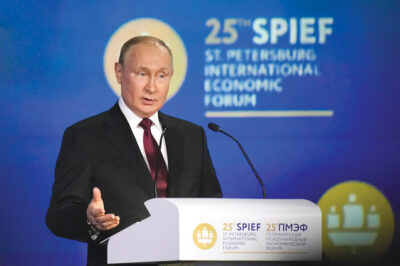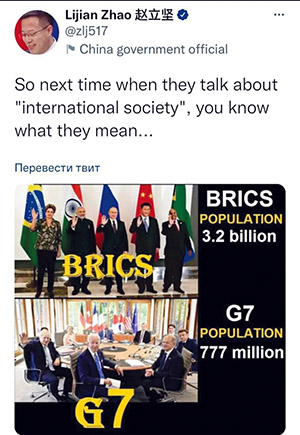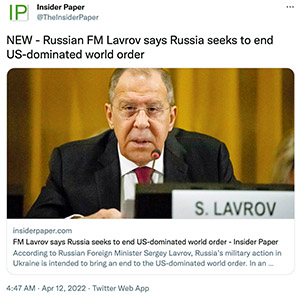From New Dawn Special Issue Vol 16 No 4 (Aug 2022)
The following was one of the final pieces written by the late Australian geopolitical analyst James O’Neill. For several years, James had been writing on these matters for New Dawn. Today we are witnessing the beginning of the new multipolar world.
The annual meeting of the Saint Petersburg International Economic Forum (STIEF) was held in June 2022. As usual, it received very little coverage in the Western mainstream media, which prefers to ignore developments in Russia or, if it mentions them at all, denigrate the importance of what is happening.
The theme of the 2022 meeting was appropriately ‘New Opportunities in a New World’. Representatives of 115 countries and regions attended. Absent were representatives of Western countries.
This year’s conference was notable on several grounds. It featured a groundbreaking speech by Russian President Vladimir Putin (of which more below), but perhaps even more importantly, it foreshadowed major changes in geopolitics and the world economic system.
The war in Ukraine has undoubtedly triggered many of the responses observed in Saint Petersburg, but they have been in the making for some time. Developments such as China’s Belt and Road Initiative (BRI) have instigated new relations between countries that mark a significant transition away from the system created and dominated by the Western powers of Europe, North America and Australasia over the past 300 years. That era is rapidly drawing to a close. However, it won’t be a peaceful transition and things will likely get a lot more fractious before the new world order is established.
The BRI has several smaller groupings, each important and contributing to the fundamental realignment of the world’s nations. But, again, these developments scarcely rate a mention in the Western media, long transformed by its own sense of importance and used to dealing with the developing world in other than an exploitative way.
This has included the use of force by the Western powers to sustain what it perceives as its right to dominate the world and force recalcitrant countries to comply with its image of how the world should be run.
Western interventions are almost invariably based on lies. One only needs to recall the invasions of Afghanistan and Iraq by United States-led forces based on allegations that Afghanistan was sheltering Osama bin Laden, the alleged mastermind of the “9/11” attacks in the United States in Sept 2001, and in the case of Iraq that they possessed weapons of mass destruction. Bin Laden died from natural causes in December 2001. His obituary was even reported in the New York Times. However, his death did not result in the Americans and their allies withdrawing from Afghanistan with apologies.
There was a similar complete absence of apology and withdrawal when the American allegations about Iraq’s alleged weapons of mass destruction also proved to be a complete lie. Now, 20 years later, the Americans still occupy Iraq and show no inclination to leave that country, much less apologise and pay compensation. They are joined by their Australian colleagues who similarly refused a 2001 demand by the Iraqi government to vacate their country.
Even the fake arrest and death of “bin Laden” in May 2011 did not result in the Americans and their friends withdrawing from Afghanistan. On the contrary, they stayed a further decade before staging an ignominious retreat.
This prolonged occupation of the country gave rise to several theories about the real reasons for the invasion and occupation. Thwarting the development of Afghanistan was one reason. Others included control of the world’s opium trade, a long-standing American preoccupation where Afghanistan was responsible for more than 80% of the world’s opium supplies. Preventing Afghanistan from joining the Chinese-led Belt and Road Initiative was also a motivation. Unfortunately, none of these real motives for the invasion and prolonged occupation of Afghanistan were ever given much coverage in the Western media.
BRICS & Putin’s Speech
The Saint Petersburg forum was also crucial in connecting to other developments helping transform the world economy. The first of these is the emergence of what some have called the “new G8,” which combines four of the BRICS nations (Brazil, China, India and Russia – but excluding South Africa) with four other emerging nations: Iran, Indonesia, Mexico and Turkey. The BRICS heads of state recently participated via video link in the 14th BRICS Summit held in China.
The combined gross domestic product of these eight nations exceeds the GDP of the original eight (as it was when Russia belonged.) The inclusion of Turkey in the grouping is perhaps the only surprise, given that country’s membership of NATO, but it marks the increasingly independent stance taken by Turkey in managing its affairs.
Putin highlighted these developments in his speech at the Saint Petersburg meeting. It is worth noting some of the highlights of the speech that the official news outlet of the Kremlin noted was “extremely important.” Putin said that new centres of power had emerged and that the old unipolar world order was not coming back. Its colonial “way of thinking” had proven a failure.
Putin noted that the United States had declared itself the victor of the Cold War and subsequently saw itself as the leader of the world in which its views were paramount. Putin rejected United States unilateralism. He referred to the “truly revolutionary, tectonic changes in geopolitics, in the global economy, and the technological sphere, and in the entire system of international relations.” Those changes were, he said, “fundamental, pivotal and inexorable.”
Over the past two years, Putin noted, the money supply in the United States has grown by 38%. In the past, similar rises took decades but now it grew by 38% or $5.9 trillion in two years. The European Union money supply also dramatically increased over the same period. It grew by about 20% or €2.5 trillion.
While at the end of 2020, imports of goods to the United States amounted to about $250 billion a month, now it has grown to about $350 billion a month. They printed and distributed money and used it, Putin alleged, to wipe out goods from third-world markets.
The Western world tried to undermine and even crash the Russian economy with its sanctions. The reverse has been the case with the cost of living in Europe being driven up. The European Union has lost its political sovereignty and instead of damaging Russia it damaged its own population and economy. The direct cost of the sanctions imposed on Russia will cost the European economies over $400 billion in one year.
The West says high energy prices are “Putin’s price hike,” which is a profoundly ignorant attempt at misdirection. Putin labelled this a “stupidity, designed for people who could neither read nor write.” The Russian leader assessed that the Western establishment’s disconnection from the people “will inevitably lead to a surge in populism and extremist and radical movements, major socioeconomic changes, degradation and a change of elites in the short term.”
Troubles with the food supply did not arise over recent months but can be traced back several years. The West caused those problems, Putin argued, in what he described as the “short-sighted actions of those who are accustomed to solving their problems at the expense of others.” Trade flows have been disrupted and distorted by printing money and what he described as a “predatory colonial policy.”
On Russia’s intervention in Ukraine, Putin described it as a forced consequence of the genocidal policies pursued by the Kiev regime, whose “neo-Nazis have received the full protection of the West.” It is difficult to argue against that analysis. The Kiev regime did nothing to implement the provisions of the Minsk accord of 2015, and their total lack of action in this regard, apart from the inevitable breaking away of the two Donbass republics and Crimea, led directly to the war that has now broken out.
The Ukrainian government has just banned two more political parties, bringing the total number of banned parties to nine. This is an open power grab by the Ukrainian president and his government, removing any opposition to their rule. This power grab and the cancellation of the legitimate existence of opposition parties receives no attention in the Western media. Instead, the Ukrainian president appears to be the darling of the West, with a willingness to overlook his manifest flaws and anti-democratic tendencies and policies to an astonishing degree.
Ukraine’s president still indulges in the fantasy of Crimea being returned to Kiev’s control, a fantasy shared with Western nations who disregard entirely the history of how Crimea became part of Ukraine in 1954 and, more recently, the overwhelming vote of its population to reunite with Russia. This is an event the Western media persistently misreports as Russia’s “annexation” of Crimea.
The President of China, Xi Jinping, delivered an address by video at the Saint Petersburg conference. Xi’s message was clearly directed to the whole of the global South. He evoked what he called “true multilateralism” in which the emerging economies of the world – not coincidentally making up the bulk of the nations in China’s Belt and Road Initiative – had to have “a say in global economic management.”
The world, said Xi, is now entering a new period of turbulence and transformation amid the ongoing radical changes and the coronavirus pandemic. The growing divide between the South and the North and weakening cooperation in the area of development could plunge the erratically reviving global economy into a deep recession. Xi quoted in his speech what he described as ancient Chinese words of wisdom, where a clever man sees a seed of crisis in every opportunity and an opportunity in every crisis.
Constructing an Alternative World Order
A good example of the emerging nature of key economic groupings is the focus on the increasingly important relationship between members of the Eurasian Economic Union (Armenia, Belarus, Kazakhstan, Kyrgyzstan and Russia) and membership of the ASEAN Group of nations (Brunei, Cambodia, Indonesia, Laos, Malaysia, Myanmar, the Philippines, Singapore, Thailand and Vietnam).
These two groups of largely developing nations are uniting in a common interest of closer international agreement. Countries that have been outside the Western-centred economic structure are combining to promote a genuine system of international cooperation.
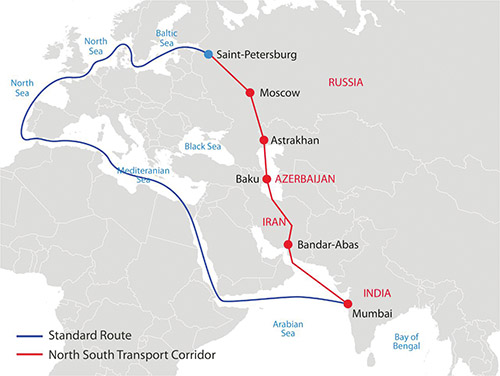
This is marked, among other things, by a rejection of the United States and the so-called “rules-based international order” which in practice means following the rules devised by, and for the benefit of, the United States. The development of a new order was one of the themes developed by Putin in his speech. This theme is finding favour not only in the international groupings noted above but is symbolised by developments on the ground like the International North-South Transport Corridor linking Russia with the Persian Gulf via the Caspian Sea and Iran. Russia has started using this new route to ship goods, bypassing the Mediterranean Sea/Suez Canal route.
During STIEF’s ‘Russia – Africa’ Business Dialogue, the Russian academician and Eurasian Economic Union (EEU) Minister for Integration and Macro-Economics, Sergei Glazyev, pointed out that the time has come to go beyond shifting payments to national currencies. He advocates creating a unified exchange space in the EEU for price formation in national currencies rather than relying on currency exchange rates based on the US dollar.
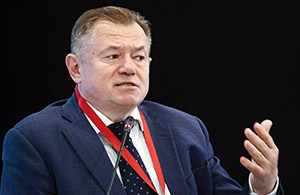
Glazyev argued for a completely different attitude to partnership and cooperation. In the hybrid war that the Western world is currently waging against the whole of humanity, he emphasised common interests with African countries. He says we are on the same front line, and to survive this war we need to strengthen economic ties, especially if a common exchange base was created to unite the Eurasian, Asian and African continents. Glazyev invited listeners to develop cooperation in creating this new monetory, financial, trade and economic architecture.
Mikhail Myasnikovich, chairman of the board of the EEU’s Eurasian Economic Commission, told the forum that it was urgent the EEU discuss the development of not only trade and payments in national currencies but construction of an independent monetary system.
These new organisations represent a major break from the old Western-dominated arrangements. They are the way of the future for countries like Australia, which has largely ignored the realities of its geography and will face considerable challenges as it is forced to turn away from the United States to ensure its economic survival.
The Belt and Road Initiative, the largest of these emerging developments, represents an existential threat to the United States’ view of the world. One can expect the United States to take steps, which it is already doing, to combat this challenge to their previous supremacy. The pressure put on Germany to cancel the Nord Stream 2 project is one example of the United States fighting the emergence of a new system that challenges its previous dominance.
As the Russia affairs expert Gilbert Doctorow (www.gilbertdoctorow.com) recently noted, Putin “argued the case that the present grave challenges to the global economic, financial and political systems have their source in wrong-headed policies in the collective West.” In Putin’s view, he wrote, “the West has not absorbed the lessons handed down in elementary school and are now trying, in the global Information War, to put the blame” for their inflation on Putin.
The emergence of new multinational arrangements and multiple new trade routes approve a more powerful force than the old United States-dominated system. This is not to suggest the transition will be easy. The United States can be expected to fight hard and dirty to try and retain its previous dominance. To invoke a Chinese curse: we live in interesting times. The trick will be to maintain the changes without a war. That may prove the greatest challenge.
It is clear from the meeting in Saint Petersburg and the BRICS summit in China that the world is undergoing epochal changes to the European system that has dominated the past 300 years. It will not be a change without challenges. It is the chance to recreate the world’s economic and social system in a new way. The challenge should be welcomed.
© New Dawn Magazine and the respective author.
For our reproduction notice, click here.

